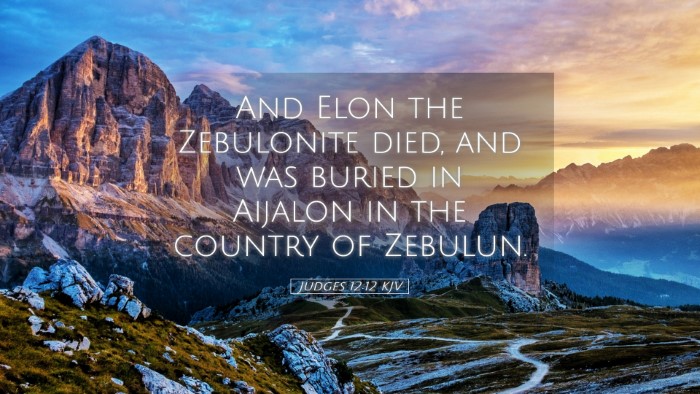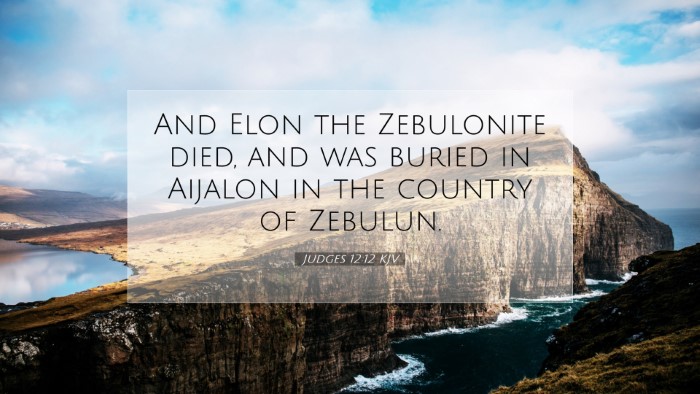Old Testament
Genesis Exodus Leviticus Numbers Deuteronomy Joshua Judges Ruth 1 Samuel 2 Samuel 1 Kings 2 Kings 1 Chronicles 2 Chronicles Ezra Nehemiah Esther Job Psalms Proverbs Ecclesiastes Song of Solomon Isaiah Jeremiah Lamentations Ezekiel Daniel Hosea Joel Amos Obadiah Jonah Micah Nahum Habakkuk Zephaniah Haggai Zechariah MalachiJudges 12:12
Judges 12:12 KJV
And Elon the Zebulonite died, and was buried in Aijalon in the country of Zebulun.
Judges 12:12 Bible Commentary
Commentary on Judges 12:12
Judges 12:12 states:
"Then Ibzan died, and was buried at Bethlehem."
Introduction
This verse serves as a concise conclusion to the life and leadership of Ibzan, one of the judges of Israel. It invites deeper reflection on the nature of leadership and legacy within the Biblical narrative.
Contextual Overview
Ibzan’s tenure as a judge is noted for its brevity, and his death marks a significant transition in the cycle of Israel's judges. In examining this verse, we not only focus on the end of Ibzan's reign but also consider the implications of his judgeship.
The Person of Ibzan
Matthew Henry's Commentary emphasizes that Ibzan is an example of the ordinary man called to extraordinary tasks. Unlike other judges who garnered more widespread recognition, Ibzan’s mention is minimal. This serves to remind the faithful that God often uses those who may not be in the spotlight but lead with integrity.
Characteristics of His Leadership
- Judicial Role: Ibzan was noted for his ability to lead and govern effectively, suggesting that leadership comes with both a divine calling and a commitment to justice.
- Family and Influence: He is said to have had thirty sons and thirty daughters, emphasizing the importance of family in Hebrew culture and highlighting the continuation of his legacy.
The Significance of Death and Burial
Albert Barnes points out that the mention of Ibzan’s death leads to reflections on mortality and the cycle of life. His burial at Bethlehem, a significant location in Jewish history, evokes an understanding that leaders are also subject to the temporal nature of existence.
Death as a Unifier
The reality of death serves to unify all. In the context of a community, the passing of a leader can act as a catalyst for reflection on shared values and collective vision.
Theological Reflections
Adam Clarke's Commentary draws attention to the theological implications of Ibzan’s life and death. His reign is indicative of God’s continued provision for Israel through judges who may not achieve the legendary status of others but are nonetheless essential for societal preservation.
Covenantal Faithfulness
The cyclical pattern of leadership and the ultimate decline into chaos serve to remind readers of God’s unwavering covenant relationship with Israel. Even in periods of decline, God’s faithfulness stands firm.
Modern Application
The lessons gleaned from Judges 12:12 provide valuable insights into current leadership within the church and society. Leaders are called to be both effective and humble, recognizing that their authority is not purely for personal glory but for the service of God’s people.
Enduring Legacy
- Character over Reputation: Ibzan’s life illustrates that the quality of one’s character outweighs the magnitude of one's public persona in the eyes of God.
- Hope in Continuity: The end of Ibzan's life also signifies hope. While individual leaders may rise and fall, God's purpose for His people continues unabated.
Conclusion
Judges 12:12 encapsulates themes of leadership, mortality, and divine providence. It is a reminder of the roles individuals play in God's redemptive history, reinforcing the belief that every life, no matter how briefly mentioned, contributes to His grand narrative. For pastors, students, theologians, and scholars, the reflection on Ibzan encourages a deeper consideration of the impact of their own leadership journeys under God’s sovereign hand.


